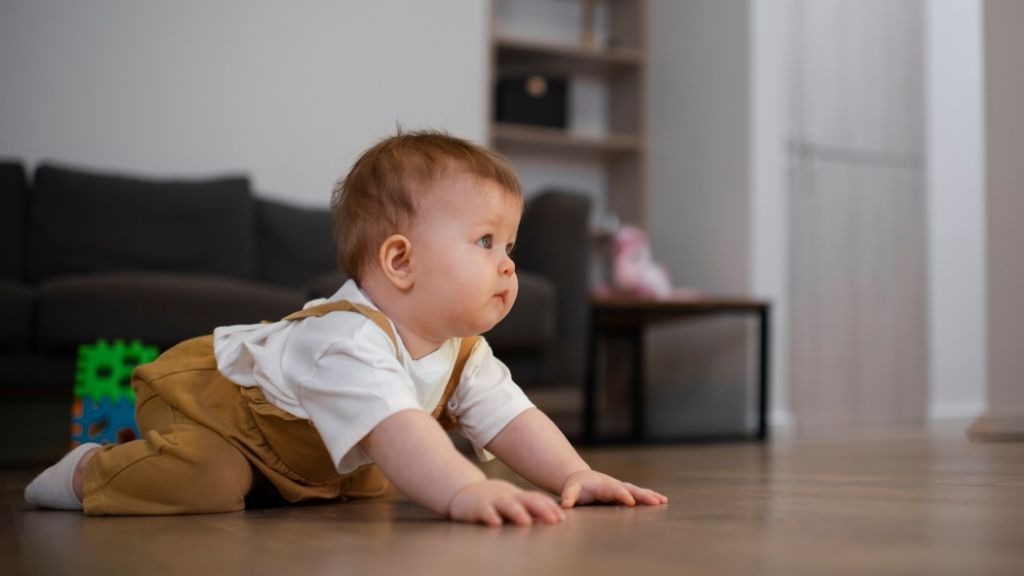Every baby grows at their own pace, but as parents, it’s natural to wonder: “Is my child meeting milestones as expected?” From smiling to crawling to babbling, these little achievements bring joy and reassurance. But sometimes, a delay in reaching certain milestones can raise concerns. The important thing to know is that not all delays mean something is wrong, and many babies catch up with time.
Understanding the signs of developmental delay early can help you support your child in the best way possible. This guide combines real parenting experiences with trusted advice from experts such as the NHS and NICE to help you identify potential red flags, know when to seek help, and learn simple steps you can take at home.
By the end, you’ll know what to look for, when to act, and most importantly, how to support your baby’s unique journey without unnecessary worry.
Many parents share stories of comparing milestones at playgroups or on social media, which can sometimes create unnecessary anxiety. While comparison is natural, it’s important to remember that every child’s journey is unique. Recognising what’s within the typical range and what may need professional input helps you feel more confident and proactive as a parent.
Understanding Developmental Delays in Babies
Developmental delay means that a child is not reaching milestones expected for their age in one or more areas. These may include:
- Physical development – sitting, crawling, walking.
- Speech and language – babbling, first words.
- Cognitive development – learning, problem solving.
- Social and emotional development – smiling, making eye contact, responding to others.
For example, a child may be quick to crawl and walk but slower to speak, or may chatter endlessly but take longer to master hand–eye coordination. Delays don’t always affect every area; sometimes they are very specific. Understanding whether a delay is isolated or across several areas helps professionals decide the right kind of support.
According to the NHS, delays can range from mild to more significant, and some may be temporary. Early recognition can make a big difference because support and therapy often help babies catch up.
Expert Tip: Developmental milestones are guides, not deadlines. Children may reach them earlier or later than expected.
Why Do Developmental Delays Happen?
There are many reasons why a baby may show delays, and often no single cause can be identified.
Some possible factors include:
- Being born prematurely.
- Low birth weight.
- Medical conditions (such as hearing or vision problems).
- Neurological or genetic conditions.
- Lack of stimulation or opportunities to practise skills.
Modern lifestyles also play a role. Too much screen time, less face to face interaction, or fewer opportunities for free play can sometimes slow down certain skills. However, this does not mean parents are at fault it simply means babies thrive best with a balance of stimulation, play, and rest. Cultural practices also influence development; in some families, babies are carried more than placed on the floor, which can delay crawling but not overall health.
This often happens because every baby develops at their own pace. What looks like a delay may simply be a slower pattern of growth.
Parent Tip: Avoid comparing your baby to siblings or other children. Each child follows a unique timeline.
Key Signs of Developmental Delays in Babies
Most cases are mild and not harmful, but here are some signs to watch for:
- No social smile by 3 months.
- Poor eye contact or lack of interest in faces.
- Not rolling by 6 months.
- Not sitting with support by 9 months.
- No babbling or sound making by 7–8 months.
- Not reaching for or grasping objects by 6 months.
- Stiff or floppy body movements.
- Lack of response to sounds, voices, or light.
If you notice several of these signs together, it’s a good idea to speak with your GP or health visitor.
It’s also useful to look at patterns rather than single signs. For instance, a baby who isn’t rolling by 6 months but is otherwise social, alert, and grabbing toys may simply be developing at a different pace. In contrast, a baby who shows several signs together such as no eye contact, no babbling, and stiff movements may benefit from an early check up. Keeping a small diary of what your baby can do makes it easier to spot progress over time and provide clear notes to your health visitor.
What Parents Can Do to Support Development
Encourage at home activities
Simple daily interactions make a huge difference:
- Provide tummy time to strengthen muscles.
- Play peekaboo and sing songs to build social skills.
- Offer colourful toys to stimulate vision and hand movements.
- Talk, read, and respond to your baby’s sounds.
Pro Tip: Just 15 minutes of tummy time spread throughout the day can significantly strengthen motor development.
When to consult a doctor
If you feel something is off, trust your instincts. Book an appointment with your GP or health visitor. They may recommend further checks or refer your baby to a specialist if needed.
Support therapies explained
Depending on the area of delay, support may include:
- Physiotherapy for motor delays.
- Speech and language therapy for communication issues.
- Occupational therapy for everyday skills.
- Specialist referrals if a medical condition is suspected.
Real Parent Insight: “We were worried when our daughter didn’t crawl by 10 months. With some physiotherapy exercises and encouragement, she started moving at her own pace. Now, you’d never know there was a delay.”
Developmental Milestones Chart for Parents
| Age Range | Typical Milestones | When to Seek Advice |
| 0–3 months | Smiles, makes eye contact, lifts head | No smile, no response to sound by 3 months |
| 4–6 months | Rolls over, reaches for toys, babbles | No rolling, no hand use by 6 months |
| 7–9 months | Sits with support, responds to name | No babbling or response by 8 months |
| 10–12 months | Crawls, pulls to stand, says first words | No crawling, no attempts at words by 12 mths |
Safety Do’s and Don’ts for Parents
- Do encourage play and tummy time daily.
- Do attend routine health visitor checks.
- Do seek advice early if you’re worried.
- Don’t ignore your instincts.
- Don’t compare your baby to others too much.
- Don’t wait too long before seeking support if concerns persist.
Emotional Support and Reassurance for Parents
If you’re feeling guilty or anxious about possible developmental delays, please don’t. These delays are common, and many babies catch up with time and a little extra support. Seeking help early is not a sign of failure but of love and care.
Remember: you are your baby’s best advocate. Trust your instincts, and reach out for support when you need it.
Parent Tip: Connect with local parent support groups or NHS child health services for reassurance and guidance.
Frequently Asked Questions
What are the most common signs of developmental delay?
Delays in smiling, rolling, babbling, or sitting are common early indicators.
Do developmental delays always mean a disability?
No. Many delays are temporary, and babies catch up with time.
When should I seek medical advice?
If milestones are missed consistently or you feel something is wrong, speak with your GP or health visitor.
Can therapy really help?
Yes. Early support such as physiotherapy or speech therapy can make a big difference.
Conclusion
Developmental delays in babies can feel worrying, but most are not serious. Early recognition and support can help your baby thrive. Most cases are mild and not harmful, but talk to your GP or health visitor if you are worried.
As a parent, I know how easy it is to worry but remember, you’re not alone in this. With the right guidance and reassurance, your baby can continue to grow at their own pace.



